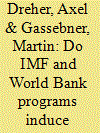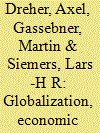| Srl | Item |
| 1 |
ID:
112461


|
|
|
|
|
| Publication |
2012.
|
| Summary/Abstract |
We examine whether and under what circumstances World Bank and International Monetary Fund (IMF) programs affect the likelihood of major government crises. We find that crises are, on average, more likely as a consequence of World Bank programs. We also find that governments face an increasing risk of entering a crisis when they remain under an IMF or World Bank arrangement once the economy's performance improves. The international financial institution's (IFI) scapegoat function thus seems to lose its value when the need for financial support is less urgent. While the probability of a crisis increases when a government turns to the IFIs, programs inherited by preceding governments do not affect the probability of a crisis. This is in line with two interpretations. First, the conclusion of IFI programs can signal the government's incompetence, and second, governments that inherit programs might be less likely to implement program conditions agreed to by their predecessors.
|
|
|
|
|
|
|
|
|
|
|
|
|
|
|
|
| 2 |
ID:
120122


|
|
|
|
|
| Publication |
2013.
|
| Summary/Abstract |
What determines the emergence and survival of democracy? The authors apply extreme bounds analysis to test the robustness of fifty-nine factors proposed in the literature, evaluating over three million regressions with data from 165 countries from 1976 to 2002. The most robust determinants of the transition to democracy are gross domestic product (GDP) growth (a negative effect), past transitions (a positive effect), and Organisation for Economic Co-operation and Development membership (a positive effect). There is some evidence that fuel exporters and Muslim countries are less likely to see democracy emerge, although the latter finding is driven entirely by oil-producing Muslim countries. Regarding the survival of democracy, the most robust determinants are GDP per capita (a positive effect) and past transitions (a negative effect). There is some evidence that having a former military leader as the chief executive has a negative effect, while having other democracies as neighbors has a reinforcing effect.
|
|
|
|
|
|
|
|
|
|
|
|
|
|
|
|
| 3 |
ID:
113757


|
|
|
|
|
| Publication |
2012.
|
| Summary/Abstract |
Using the KOF Index of Globalization and two indices of economic freedom, the authors empirically analyze whether globalization and economic liberalization affect governments' respect for human rights in a panel of 106 countries over the 1981-2004 period. According to their results, physical integrity rights significantly and robustly increase with globalization and economic freedom, while empowerment rights are not robustly affected. Due to the lack of consensus about the appropriate level of empowerment rights as compared to the outright rejection of any violation of physical integrity rights, the global community is presumably less effective in promoting empowerment rights.
|
|
|
|
|
|
|
|
|
|
|
|
|
|
|
|